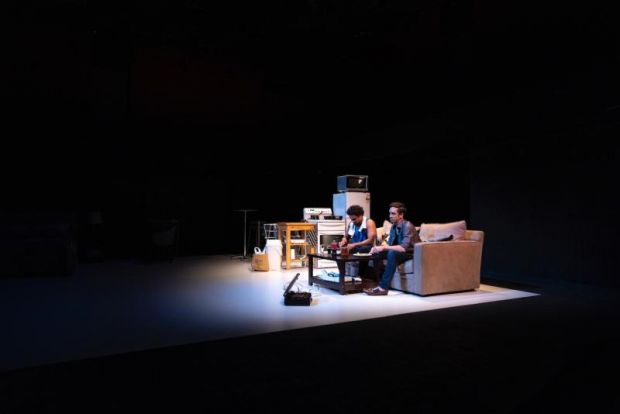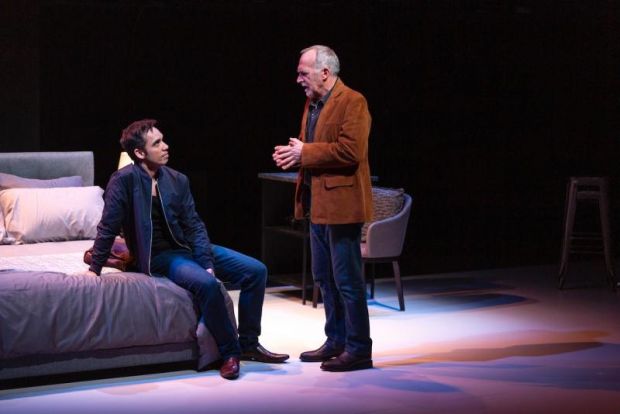Jacky
Jacky is what used to be called a ‘problem play’. In its incisive way, it dramatises an abiding and just now very contemporary issue: the place of indigenous people (and their culture) in a whitefella dominated, post-colonial society. If that sounds all too ‘worthy’, Declan Furber Gillick’s play does that with sometimes shocking comedy, clear-eyed courage, and via vivid, sharply delineated characters.
The eponymous Jacky (Guy Simon), a clean-cut, young Aboriginal young bloke, has left (escaped?) the ‘mish’ (mission) and his family, and come to the big city where he is doing… okay. He works various casual jobs and performs ‘culture’ via dance. He has a rented, one-bed, always neat apartment, but is determined to buy his own place – the reason why he is a gay sex worker. Jacky is, in his way, trying to ‘fit in’ but his life is thrown into disarray by the disruptive arrival of his brother Keith (Ngali Shaw), initially an enormously attractive figure – a marked contrast to quiet, obliging, cooperative Jacky. Keith is bursting with energy and chiacking humour – but he’s also alienated and angry. Jacky is, of course, obliged to help his recalcitrant brother; he solemnly and impatiently talks of responsibility and getting qualifications.
Jacky is the protégé of white Linda (Alison Whyte) who runs a community support organisation for the homeless, migrants and refugees, and is trying to expand to include urban indigenous people. Naturally, Linda, a tireless opportunist, spends most of her time trying to get funding. Then there’s Glen (Greg Stone), a dealer in classic vinyl and a blues aficionado. Glen’s fantasy is ‘big, black cock’ and so he chooses Jacky to act this out…

These characters are, in one way or another, liars – force majeure. Jacky diluting his Aboriginality, hiding his sexuality and his sex work, Linda because she has to be a smoodger and a booster, Keith because he tries to string Jacky along and lie about his motives for being there, and Glen whose ‘big, black cock’ thing is a manifestation of deep-rooted racism.
Jacky runs an hour and forty minutes, but director Mark Wilson (also dramaturg with Jennifer Medway) maintains a cracking pace with smooth transitions aided by Christina Smith’s simple but clever set design: an Irish pub, Jacky’s apartment and the hotel room where Jacky and Glen meet for sex.
People of a certain age may remember that one of the very few indigenous people mentioned by name in our primary school textbooks was one ‘Jackey-Jackey’ (real name Galmahra), admired as the ‘faithful’ guide to explorer and his ‘master’ Edmund Kennedy in 1848. As time went on, respect, such as it was, soured and ‘Jackey-Jackey’ became a whitefella catch-all term for indigenous people – shiftless, lazy, useless, etc. For those indigenous people themselves ‘Jackey-Jackey’ became a kind of insult: it meant a servile individual willingly cooperating with slavery and dispossession. I wonder if Furber Gillick had that opposition in mind. It is certainly dramatised in this layered play.

It's there for the eponymous Jacky, a man with a foot in two camps, still irrevocably tied to family and Country, while trying and half-succeeding in whitefella society – but as a deracinated black rent boy and a ‘performer’ of indigenous culture via dance. Smiling, non-threatening, obliging, not uppity and angry like his brother Keith.
For realist, whatever-it-takes Linda, he’s the useful (and sole) indigenous guy – a cultural exhibit - she can show off to ‘investors’ - mining executives mostly – the irony just sits there – to keep her foundation afloat.
And for Glen, Jacky is the vehicle for his racist ambivalence, his sexual fantasies of dominating and being dominated. He suggests that he ‘penetrate’ Jacky instead of Jacky penetrating him. That’s fine with Jacky. But when Glen orders Jacky to kneel and is about to whip him with his belt while abusing him, telling Jacky he ‘owns’ him and can do as he likes with him. Jacky arcs up: that’s it, it’s over, finished. Glen claims this is just role-playing, like all the other stuff they do in that hotel room, but this time he goes too far, and Jacky gets it. Glen is devastated. He pleads. He tells Jacky he loves him – and curiously we believe him. As Stan Grant writes in his The Queen is Dead, ‘Racism can have the kindest face.’'

Jacky manages to be hugely entertaining and deeply serious at the same time. Furber Gillick skilfully and without being didactic mines the contradictions, and the racism – conscious and unconscious - of Australia and does it from four clear, and representative points of view. There were cheers and loud applause at the end for a supposedly optimistic finish – but it too, in keeping with the rest, is deeply ironic.
Michael Brindley
Photographer: Pia Johnson
Subscribe to our E-Newsletter, buy our latest print edition or find a Performing Arts book at Book Nook.

